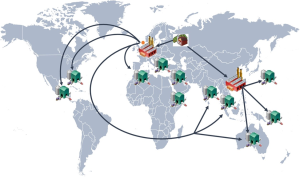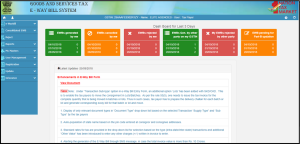Logistics thrives on efficiency while serving as the foundation for streamlined operations. The strategic knowledge of the best transport routes empowers businesses to intricately plan their logistics, ensuring punctual delivery while minimizing the risk of E-waybill expiration.
A meticulously planned route significantly enhances the overall efficiency of the supply chain, with the E-waybill playing a pivotal role in facilitating the smooth transportation of goods.
At the heart of E-waybill compliance lies the meticulous calculation of the distance that goods must travel. The validity of an E-waybill is intricately tied to this measurement, first understanding, and then calculating the distance between the source and destination.
Boils down to cost
Transportation costs can be a substantial component of operational expenses for businesses. Understanding transport routes enables companies to optimize these costs effectively, enhancing overall operational efficiency and offering a competitive edge in the market.
Being familiar with transport routes allows businesses to anticipate and mitigate potential risks. Whether it’s roadblocks, congestion, or adverse weather conditions, this knowledge ensures smooth transportation and, consequently, E-waybill compliance. Remaining on the toes and proactively managing risks is a hallmark of a well-organized logistics strategy.

Beyond operational considerations, regulatory compliance is a fundamental reason for understanding distance and transport routes. In the context of E-waybill generation, a GST-registered person cannot transport goods in a vehicle exceeding Rs. 50,000 in value without a valid E-waybill. This regulatory requirement underscores the importance of route knowledge.
Businesses should familiarize themselves with the E-waybill requirements, including the need for accurate distance calculations and transport route information. Investing in technology is a positive step businesses can take to ensure accurate distance calculations and efficient route planning. GPS and other tracking technologies can provide real-time updates, contributing to precise distance measurement and optimal route selection.
Others
Training the staff on the importance of accurate distance calculations and transport route knowledge is equally important. The tendency to make mistakes in the field of logistics is very common and well-trained personnel contribute significantly to the accuracy of E-waybill documentation.
Regular audits play a vital role in ensuring the accuracy of E-waybill documentation. Businesses should conduct regular checks to identify any discrepancies and promptly address them to avoid compliance issues.
Leveraging logistics partners can provide valuable insights into the most efficient transport routes. Collaborating with experienced partners in the logistics domain can contribute to the overall efficiency of E-waybill generation.
Staying updated with regulatory changes is a continuous process. Businesses should stay informed about any amendments or additions to E-waybill regulations to ensure ongoing compliance.
By taking these proactive steps, businesses can fortify their E-waybill compliance efforts, ensuring that accurate distance calculations and transport route knowledge are integral parts of their logistical operations.

One example of how important producing E-Waybill promptly is when Modern Traders goods were intercepted by the authorities in Uttar Pradesh. The Hon’ble Allahabad High Court ruled in favor of Modern Traders stating, ‘When the E-waybill is produced on the same day of goods interception, along with documents indicating GST payment, there is no justification for seizure and penalty orders.’
This underscores the importance of having accurate distance and transport route information readily available.
E-commerce companies like Amazon and Flipkart have mastered the art of effective distance and transport route management as these companies handle a substantial volume of shipments daily, relying on advanced logistics and supply chain management systems to calculate distances accurately and choose the most efficient transport routes. This strategic approach ensures not only accurate E-waybills but also compliance with GST regulations.
It is even more so for companies like DHL and FedEx.
Also Read: Challenges and Solutions in Import E-waybill Compliance: Cross-border Considerations
The key takeaway’s are :
- Investing in technology remains a crucial aspect. The use of GPS and other tracking technologies for accurate distance calculation and efficient route planning cannot be overstated.
- Route optimization strategies should be implemented, considering various factors such as distance, travel time, traffic conditions, and vehicle capacity.
- The adoption of software, including multi-stop route planning tools and APIs, can significantly simplify the route optimization process. This is particularly relevant for businesses with complex delivery networks, where efficient route planning is essential.
- Automation further enhances the optimization process. By automating aspects like traffic and weather condition considerations, businesses can achieve more precise and dynamic route planning.
- Training staff on the importance of accurate distance calculations and transport route knowledge should be an ongoing effort. The human factor remains pivotal in ensuring the accuracy of E-waybill processes.
- Regular audits continue to be a fundamental practice. Identifying inaccuracies in E-waybill documentation through regular checks allows businesses to take corrective measures promptly, maintaining compliance.
- Staying updated with E-waybill regulations is an ongoing commitment. Businesses should actively monitor and adapt to any changes in the regulatory landscape to ensure continued compliance.
By considering these points, businesses can refine their processes related to distance and transport route knowledge for E-waybill generation. This not only ensures compliance but also contributes to improved operational efficiency.
Organizations and Logistics companies that have excelled in executing strategy for aligning distance and transport route information with E-waybill compliance can have a significant impact on the bottom line of their balance sheet while also offering other advantages such as:
- Increased Efficiency: Accurate distance calculations and efficient route planning streamline the logistics process, reducing delays, avoiding penalties, and improving the overall efficiency of the supply chain.
- Cost Savings: By choosing the most efficient routes and accurately calculating distances, businesses can optimize their transportation costs, having a significant impact on their bottom line.
- Enhanced Customer Satisfaction: Timely delivery of goods is crucial for customer satisfaction. Efficient route planning and accurate distance calculations can ensure that goods are delivered on time.
- Competitive Advantage: Businesses that can effectively manage their logistics and comply with E-waybill regulations can gain a competitive advantage over those that cannot.
- Risk Mitigation: Familiarity with transport routes can help businesses anticipate and mitigate potential risks such as roadblocks, congestion, or unfavorable weather conditions, ensuring smooth transportation and E-waybill compliance.
To sum up, E-waybill compliance is directly tied to understanding of distance and transport routes. Businesses that prioritize this knowledge not only adhere to regulatory requirements but also unlock operational efficiencies, cost savings, and a competitive edge in the market.
Also Read: What Are The Benefits Of Integrating GST Registration With Your Invoice/ Billing Software?
Also Listen: How to create E-way Bill With CaptainBiz
Frequently Asked Questions
-
Why is understanding transport routes crucial for businesses?
Understanding transport routes is crucial as it empowers businesses to intricately plan logistics, ensuring punctual delivery and minimizing the risk of E-waybill expiration.
-
How does a well-planned route enhance supply chain efficiency?
A meticulously planned route significantly enhances the overall efficiency of the supply chain, with the E-waybill playing a pivotal role in facilitating the smooth transportation of goods.
-
What is at the core of E-waybill compliance?
At the core of E-waybill compliance lies the meticulous calculation of the distance that goods must travel, directly influencing the validity of the E-waybill.
-
Why is understanding transport routes essential for cost optimization?
Understanding transport routes enables companies to optimize transportation costs effectively, enhancing overall operational efficiency and offering a competitive edge in the market.
-
How does familiarity with transport routes help in risk mitigation?
Familiarity with transport routes allows businesses to anticipate and mitigate potential risks, ensuring smooth transportation and, consequently, E-waybill compliance.
-
What role does regulatory compliance play in understanding distance and transport routes?
Regulatory compliance is fundamental for E-waybill generation. A GST-registered person cannot transport goods exceeding Rs. 50,000 in value without a valid E-waybill, emphasizing the importance of route knowledge.
-
Why should businesses invest in technology for accurate distance calculations and route planning?
Investing in technology, such as GPS and tracking technologies, ensures accurate distance calculations and efficient route planning, contributing to precise E-waybill generation.
-
What is the significance of staff training in logistics operations for E-waybill compliance?
Training staff on the importance of accurate distance calculations and transport route knowledge is crucial, contributing significantly to the accuracy of E-waybill documentation.
-
How do regular audits contribute to E-waybill compliance?
Regular audits play a vital role in ensuring the accuracy of E-waybill documentation. They help identify discrepancies promptly, avoiding compliance issues.
-
How can logistics partners contribute to efficient E-waybill generation?
Collaborating with logistics partners can provide valuable insights into the most efficient transport routes, contributing to the overall efficiency of E-waybill generation.

